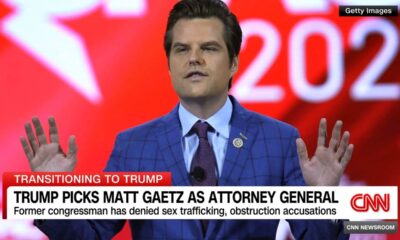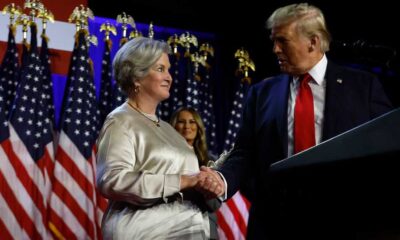NEWS
Breaking News: Supreme Court won’t hear case stemming from Jack Smith’s secret warrant for Trump’s Twitter data…. See More

The data obtained by the special counsel may be key evidence against the former president if the federal election-subversion case ever reaches trial.
The Supreme Court has declined to hear X Corp.’s challenge to the process that special counsel Jack Smith used to obtain a secret search warrant for Donald Trump’s account data. | Joel Saget / AFP via Getty Images
The Supreme Court has declined to take up a challenge by X Corp. to the process by which special counsel Jack Smith obtained a secret search warrant for Donald Trump’s account data.
The decision, for now, maintains the Justice Department’s use of a tool — known as a nondisclosure order or NDO — to prohibit third parties like telecom companies and social media providers from notifying subscribers when they receive a search warrant for their information.
Prosecutors say nondisclosure orders, which must be approved by courts, are vital to prevent subjects of criminal probes from destroying evidence or influencing witnesses. By law, the orders are required to be time-limited and tailored narrowly, though X — represented by high-powered lawyers from WilmerHale — said NDOs are granted too easily and with few limits.
The battle over the particular NDO used in Trump’s case is largely a moot point. Smith obtained all of the data he was seeking in early 2023, and his recent filings suggest the data about Trump’s social media use on and before Jan. 6, 2021, will be critical evidence as the special counsel seeks to continue his prosecution of the former president for conspiring to subvert the 2020 election.
Smith obtained Trump’s data only after a federal district judge held the company — then known as Twitter — in contempt for missing court-ordered deadlines to comply with prosecutors’ demands.
The then-chief judge of the federal district court in Washington, Beryl Howell, fined the company $350,000, concluding it had violated her order for three days. Howell mused that the company’s new owner, Elon Musk, may have been behind its resistance, though the attorneys sharply denied the suggestion
X tried to take the case to the Supreme Court, arguing that the justices should consider the issue of NDOs more broadly, since it is likely to emerge in future battles with the government. In fact, the company is fighting another such battle in a secretive federal investigation that has been described in court filings as bearing the same contours as the fight over Trump’s account. Chief Judge James Boasberg, however, has indicated that the more recent brawl is not related to the 2020 election
As is customary, the justices provided no explanation for their decision to decline to hear the case. No justice recorded any dissent from the move, revealed in a 50-page set of orders the court released Monday disposing of a large batch of petitions that accumulated over the summer.
The significance of the data that Smith obtained was evident in last week’s high-profile filing detailing the results of his two-year investigation. He described Trump’s Twitter habits in the run-up to the Jan. 6 attack and was able to verify Trump as the author — and usually, the direct sender — of his tweets. Trump, Smith wrote, was by himself in the Oval Office dining room when he sent a tweet in the middle of the violence at the Capitol attacking then-Vice President Mike Pence for lacking the “courage” to attempt to overturn the election results.
X is not the only tech company to have battled against the nondisclosure orders, arguing that they violate the First Amendment. Google put up a similar and similarly unsuccessful fight in New York.
A bill to limit federal prosecutors’ use of nondisclosure orders passed the House unanimously last year. The legislation was introduced in the Senate earlier this year but has yet to receive a vote.
Also on Monday, the Supreme Court sidelined another pending case stemming from the Jan. 6 attack, declining to consider a riot defendant’s challenge to his conviction on misdemeanor disorderly conduct charges during the melee. Russell Alford opposed the rulings of two lower courts, including U.S. District Judge Tanya Chutkan, who is presiding over Trump’s criminal case, that even passive members of the Jan. 6 mob can be guilty of acting in a disorderly or disruptive manner.
The justices’ decision to let Alford’s convictions stand is a victory, for now, for the Justice Department, which has recently seen several other core charges against riot defendants face challenges or defeats in court.























